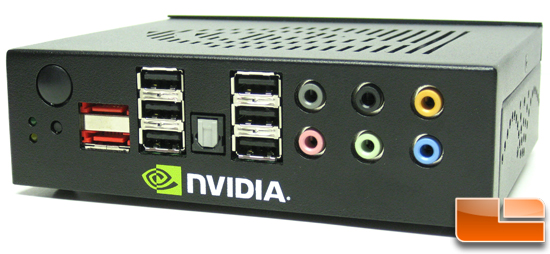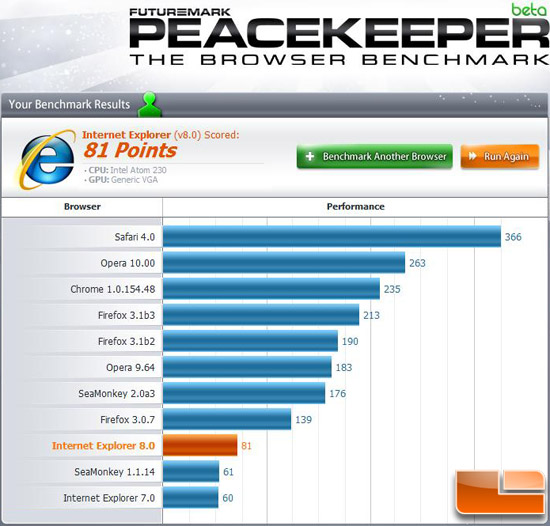Which Internet Browser is Fastest for Windows?
Benchmarking 11 Internet Browsers
UPDATE: Please note that we posted a newer browser article that was done in June 2010 that can be read here that shows newer web browser versions!
When it comes to benchmarks Legit Reviews has run our fair share of them over the past seven years, but we’ve never run a benchmark that is dedicated to looking at the performance of internet browsers. Futuremark Corporation today unveiled Peacekeeper, a free online benchmarking tool for measuring and comparing the performance of common internet browsers. Futuremark claims that the benchmark realistically simulates the load placed on the browser by common JavaScript functions as used by popular, modern web 2.0 websites. For users who prioritize speed and performance, Peacekeeper helps answer the question of which browser is best for them. The press release that Futuremark sent out with the announcement talked about benchmark results using a PC with an Intel Core 2 Duo E8400 processor, so I figured we’d look at entry level performance numbers on a system like a Netbook. After all, if anyone needs to know how to make their PC experience better it is someone on a system that runs slowly! If you’ve ever used a netbook with an Intel Atom processor you’ll know that the platform works, but is slower than what you are used to on a traditional PC.

Rather than testing out the browsers on an ASUS Eee PC or MSI Wind netbook we are going to do one better for you. We actually happen to have one of the prototype NVIDIA Ion platforms on the test bench this week, so what better to benchmark than it! The NVIDIA Ion platform has been one of the most anticipated platforms since it was shown off at CES back in January 2009 and even more so when the performance numbers were released later that same month. Since then the NVIDIA Ion uses the Intel Atom 230 processor, a single 2GB DDR2 533MHz SO-DIMM memory module, and the GeForce 9400M 256MB graphics processing unit it is basically what one will find in many netbooks. If you want to see the specifics on the test platform click here; otherwise we are headed straight to testing the 11 browsers that we downloaded and benchmarked.
The 11 Browsers Benchmarked:
To create the tests Futuremark used a profiler to analyze JavaScript usage while browsing popular websites such as YouTube, Facebook, GMail and Meebo. The profiler collected data on the frequency in which different JavaScript functions were called on these sites and Futuremark used this data to create specific weighted tests for each function. The end result is a benchmark and shows ‘true’ JavaScript performance on browsers that can be run on any operating system and platform as long as it can run JavaScript.

Using a resolution of 1920×1200 and no other applications open, we fired up the brand new Peacemaker benchmark to see which was the fastest browser. After the dust settled Apple’s Safari 4.0 beta was clearly in the lead and was found to be over six times faster than the slowest browser, Microsoft’s Internet Explorer 7.0. It should be pointed out that SeaMonkey 2.0 Alpha 3 did very well and offers significant improvements over SeaMonkey 1.1.14. Firefox 3.1 beta 3 was just released this afternoon and it offers better performance than the previous beta. Google Chrome and Opera were at the top of the performance list as well, but what does all of this mean to our readers?
To find out the answer to the question I kept Jukka Mkinen, the Vice President of PC Products and Services, from going to bed early tonight. I told Mr. Mkinen that Legit Reviews tested 11 browsers and found a 6x difference between the slowest and the fastest browser. I then asked what the results mean for real world performance and if users will see a 6x performance improvement when changing browsers or just on pages that use a certain style of scripting. His answer was short and to the point:
Users will see a 6x performance increase in running scripts. However, this may not directly translate to 6x faster browsing experience, as a variety of other factors also play a part – such as the speed of your internet connection. On script heavy websites (many popular web2.0 sites fall into this category), the performance difference is quite tangible. – Jukka Mkinen
If you are looking to find the fastest Microsoft Windows based browser it looks like Safari 4.0 Beta is the fastest thing out there that you can download today. With the rising popularity of netbooks and small form factor PCs the speed of a browser will become more important as many of the social networking sites are still growing and feature web 2.0 scripting. The one negative about this benchmark is that it is all about scripting speed and not the features that each browser offers. If you’d like more details on what exactly the Peacemaker benchmark is testing be sure to check out the FAQ and try out the benchmark as it is free!
Legit Bottom Line: After testing 11 browsers Apple’s Safari 4.0 Beta proved to be the quickest for script heavy web sites.

Comments are closed.